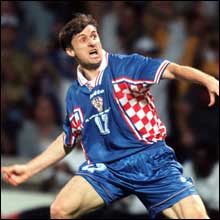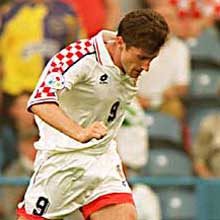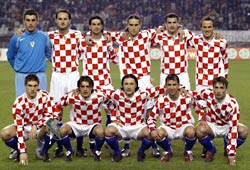
Croatia History

Croatia's
passion pays dividends
Croatia emerged as major players in world football with a sensational
third-place finish at the 1998 FIFA World Cup finals, but the foundations for
football in the former Yugoslavian republic had been laid down much earlier.
English import
English workers had brought the game to the Croatian city of Rijeka as early as
1873, and English seamen docking at the port of Zadar also left the Croatian
people a footballing legacy which would lead to the sport taking a firm foothold
on the Adriatic coast.
Long wait
However, while clubs were playing the game regularly early in the 20th century,
it was not until 1912 that the then independent Croatia founded its own
governing body for the game - the Croatian Football Federation (HNS) - and it
was a good while longer until the Croatian national team played its first game.
Yugoslavia's gain
Fused together with their Serbian and Slovenian neighbours after the first world
war, the great Croatian players of the early 20th century would be playing for
Yugoslavia rather than representing the region in which most of them were born.
Croatian presence
Some 12 of the 24 players who represented Yugoslavia at the first FIFA World Cup
in 1930 were from the Croatian city of Split, but they served their new home
country well as Yugoslavia reached the semi-finals, only to be humbled by
eventual winners Uruguay.
First international
Declaring independence during the second world war, Croatia played their first
international game under their own name on 2 May 1940, beating Hungary 1-0 in a
friendly in Budapest. However, independence was not to last long as first the
Nazis and then the Communist Bloc reined the region back under their control.
Dinamo fans
In post-war Yugoslavia, Croatians were once again without a national team and
tended to back NK Dinamo Zagreb in the predominantly Serbian Yugoslavian league.
Dinamo were to have some success, winning the Inter-Cities Fairs' Cup in 1967
and the league title in 1982. Significantly, that success came under coach
Miroslav Blazevic - who would go on to lead Croatia in their golden age in the
1990s.
Youth triumph
Another key stage in the development of Croatian football was Yugoslavia's
success at the 1987 FIFA World Youth Championship in Chile. Many members of that
team went on to become full international stars - Zvonimir Boban, Robert
Prosinecki, Davor Šuker and Robert Jarni.
Quick success
Independence brought the revival of the HNS, and some 80 years after its
formation it became a member of both UEFA and FIFA. And within only a few years,
the young prospects of 1987 were making a big impact.
Perfect peak
Bowing out in the quarter-finals at their first UEFA European Championship -
EURO 96™ - Blazevic's side hit their absolute peak at the 1998 World Cup. Having
been knocked out by Germany at EURO 96™, Croatia took particular delight in
inflicting a 3-0 defeat on the Germans in the quarter-finals with Jarni and
Šuker scoring a goal each.
Šuker honoured
France only narrowly outstripped the Croatians in the semi-final - winning 2-1
after going a goal behind. A third-place play-off win against the Netherlands
secured a bronze medal for the squad, while Šuker scooped the Golden Boot as the
tournament's top scorer.
Time flies
Failing to qualify for UEFA EURO 2000™, and underperforming at the 2002
World Cup finals, the golden boys of 1998 are all but gone. However, all is not
lost and the likes of Dado Pršo and Ivica Olic are now hoping to fill the shoes
once occupied by Šuker's heroes.
Country Info

National pride
to the fore
AREA: 56,542 sq km
POPULATION: 4,422,248
NEIGHBOURS: Bosnia-Herzegovina, Hungary, Serbia and Montenegro, Slovenia
LANGUAGES: Croatian
CAPITAL CITY: Zagreb
An independent republic for the first time in several centuries, Croatia has a sporting reputation to match its status as one of Europe's most beautiful, and increasingly popular, tourist destinations.
Ancient history
The Adriatic islands off the Croatian coast had been colonised by the Greeks by
the fourth century BC, while the Romans had taken charge of the Croatian
coastline by 100 BC. Indeed, the Roman Emperor Diocletian was based in Split,
then called Spalato, in the third and fourth centuries AD, leaving behind him a
magnificent palace on the Croatian coast which remains one of Europe's greatest
classical treasures.
Croat settlers
However, it was not until the seventh century that the first Croats stumbled
upon the nation. The Slavic tribe quickly took control, accepting Christianity
and forging a national identity. In 852, ruler Duke Trpimir issued a bill
bearing the name 'Croatia', while the uniting of Slavonia and Dalmatia by King
Tomislav in 925 saw a Croatian take shape which prospered for several centuries.
Austrian rule
With invasions from the east by Tatars devastating the old nation, Croatia was
to be less prosperous in the early part of the last millennium, and in 1493,
Turkish invaders attacked causing real hardship. In 1527 the Croatian
parliament, wary of the continued Turkish threat, elected to join the Austrian
empire where it would remain for almost 400 years - aside from a brief period of
Napoleonic rule.
Football arrives
The twilight of the Austrian Hapsburg's saw the birth of Croatian football with
the first games being played by English foresters and their local assistants in
Zupanja in 1880. A museum proudly displays one of the oldest footballs in
Croatia, dating from this period, belonged to Zupanja side NK Granicar.
First international
The game rapidly became popular, and was introduced into the school
curriculum under its Croatian name 'nogomet' in 1894. By 1903, the Croatian
capital Zagreb already boasted two organised sides, HAŠK and PNIŠK, and it was
players from those two clubs who banded together to play Croatia's first
'international' games against Czech side SK Slavia Praha - they lost 15-0 and
20-0.
League debuts
A Croatian league began in 1912, the year after HNK Jajduk Split and Gradjanski,
the predecessor of NK Dinamo Zagreb, were first established as clubs. However,
the first world war was to interrupt any further development, and as Croatia was
became part of the Kingdom of Serbians, Slovenians and Croats - later to become
Yugoslavia - in 1918, the future of Croatian football took a major turn.
Yugoslavia beckons
Croatia's lot would be thrown in with that of Yugoslavia for much of the 20th
century, although the Croatian Football Federation briefly became a member of
FIFA during World War Two as a fascist puppet government led an early bid for
independence.
National success
Croatian players certainly thrived under communist rule in Yugoslavia, playing
their part in the country's 1960 Olympic footballing triumph and fourth-place
finish at the 1962 FIFA World Cup. Meanwhile Dinamo won the Inter Cities' Fairs
Cup - the predecessor of the UEFA Cup - in 1967.
Independent brilliance
However, the period following the wars of independence in the 1990s brought even
more dramatic success. Hajduk reached the quarter-finals of the European
Champion Clubs' Cup in 1995 and Croatia surprisingly qualified for EURO '96™
before the brilliant team of 1998, led by coach Miroslav Blaževic and golden
boot winner Davor Šuker, finished third at the FIFA World Cup.
Today year 2004 Croatia team

Player name list
|
Šimic Dario |
Defender |
|
Šimunic Josip |
Defender |
|
Babic Marko |
Midfield |
|
Butina Tomislav |
Goalkeeper |
|
Leko Jerko |
Midfield |
|
Maric Marijo |
Forward |
|
Mornar Ivica |
Midfield |
|
Kovac Niko |
Midfield |
|
Olic Ivica |
Forward |
|
Pletikosa Stipe |
Goalkeeper |
|
Pršo Dado |
Forward |
|
Rapaic Milan |
Forward |
|
Kovac Robert |
Defender |
|
Rosso Giovani |
Midfield |
|
Srna Darijo |
Midfield |
|
Tomas Stjepan |
Defender |
|
Tudor Igor |
Defender |
|
Zivkovic Boris |
Defender |
|
|||||||||||||||||||||||||||||||||||||||||||||||||||||
| Group B | |||||||
| PLD | W | D | L | GS | GA | PTS | |
|
|
3 | 2 | 1 | 0 | 7 | 4 | 7 |
|
|
3 | 2 | 0 | 1 | 8 | 4 | 6 |
|
|
3 | 0 | 2 | 1 | 4 | 6 | 2 |
|
|
3 | 0 | 1 | 2 | 1 | 6 | 1 |